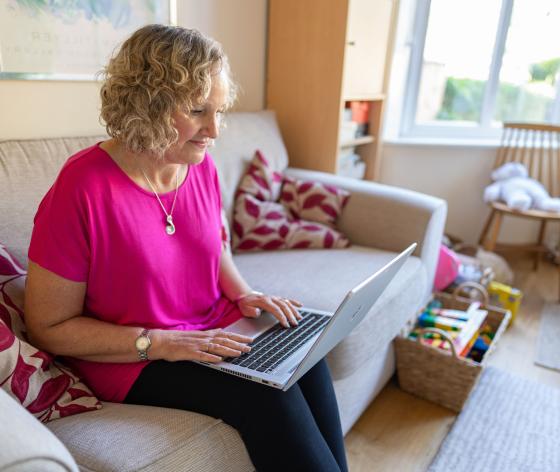Your pension
Pension schemes generally fall into two categories:
-
Defined pension schemes: these define the pension you get and the age you can get it (for example final/average salary schemes).
-
Defined contribution schemes: this is where you and an employer pay a set amount into a pension pot but where the final amount depends on factors such as how long you've been paying in and performance.
How does having ovarian cancer affect your pension?
Being diagnosed with ovarian cancer may have some impact on your pension if you have a private or occupational pension (separate from the State Pension paid by the UK government). For example, if you choose to stop working and paying into your pension scheme, the final pension amount may be smaller. It’s a good idea to check with your current pension scheme to see if your diagnosis causes anything to change before you stop making payments.
You may have the option to retire and claim your pension early because of ill health. Whether you can do this will depend on the type of pension you have and the rules of your scheme. For example there may be more flexibility in a defined pension scheme, especially after the age of 55. Speak to your pension scheme about whether you can and what this means for the amount of pension you would receive.
The Money and Pensions Service offers free information and impartial advice on your pensions options. You can also check if you have access to free independent advice via your trade union (if you’re a member) or through your insurance policies.
Insurance
An ovarian cancer diagnosis can affect how much you pay in insurance premiums for health, travel or life insurance. Even if you’re not having treatment anymore, cancer is classed as a pre-existing condition meaning you may be given certain terms and conditions to be insured. Sometimes you may be refused insurance if you try to take out a new insurance policy. This is because insurance companies work out insurance premiums based on the chance of someone claiming on their policy. Prices and policies can vary so it’s important you shop around.
Below are some options if you have any questions, or want to speak to someone for advice on insurance policies:
-
Maggie's benefits and financial advisors can provide information and support about insurance.
-
Macmillan offer information on cancer insurance plans on their support line.
-
It may be useful to contact an insurance broker or financial adviser. However, it's very important to always check they're reliable. The British Insurance Broker's Association has a list of brokers.
- Health and critical illness insurance
-
Being diagnosed with ovarian cancer shouldn’t affect any existing health or critical illness insurance and if you had this type of insurance before your diagnosis you could be entitled to make a claim. There’s usually a time limit on making these claims so it’s worth speaking to your insurance provider and claiming as soon as possible if you’re eligible. Whether or not you’re eligible will depend on the type of insurance you have and your insurance provider.
If you didn’t have insurance before your diagnosis you may find it more difficult to get new insurance now. Insurance companies may quote you a very high monthly or yearly cost. They may refuse to insure you. So, it’s worth looking around at what’s available. You can also talk to an insurance broker who can advise you on more specialist policies.
- Life insurance
-
An ovarian cancer diagnosis (or any other change in your health) won’t affect the monthly or yearly amount that you pay on existing life insurance policies. But if you’re applying for a new life insurance policy after your diagnosis you’ll usually be asked to pay more or may be refused cover. Whether or not you get life insurance and on what terms will depend on the type and stage of the cancer and other health factors. If this is something you want to explore it may be worth speaking to an insurance broker who specialises in arranging life insurance for people with a cancer diagnosis.
- Travel insurance
-
When you apply for travel insurance, cancer is classed as a pre-existing condition. This is even if you’re not currently undergoing treatment or you had cancer a long time ago. You may find that standard travel insurance policies exclude you because of your cancer, or exclude any risks linked to your cancer or treatment. There are also more specialist policies available for people with pre-existing health conditions. You may want to ask an insurance broker for advice about the best options for you. You should be open with your travel insurance provider and ask for their guidance. If you don’t tell them about a pre-existing condition and you need to make a claim, they may refuse to pay, even if the claim isn’t linked to the cancer.
- Global health insurance card
-
If you’re travelling abroad you can apply for a free UK Global Health Insurance Card (UK GHIC). This is available via the NHS website and allows you to access state healthcare in Europe either free or at a lower cost. In some cases you may be able to apply for a free UK European Health Insurance Card (UK EHIC) instead of a GHIC. Both cards give you the same level of cover but are valid in different countries:
| Countries card is valid in |
UK GHIC |
UK EHIC |
| European Union and Switzerland |
Yes |
Yes |
| Norway, Iceland and Lichenstein |
No |
Yes |
| More countries may be added in the future |
Yes |
No |
If you still have a valid UK EHIC from before the UK left the European Union you can keep using this until the expiry date on the card. Once this has expired you’ll need to apply for a new card. You can apply for this up to six months before your UK EHIC expires.
These cards don’t cover treatment planned in advance but if you do need continued treatment for an ongoing illness while you're abroad (like regular injections) they do cover this. They also may not cover all of the cost of healthcare within European countries. They also don’t cover healthcare in countries beyond Europe so it’s important to always look at getting travel insurance as well if travelling.
Cancer Research UK has more information about accessing healthcare when abroad.






